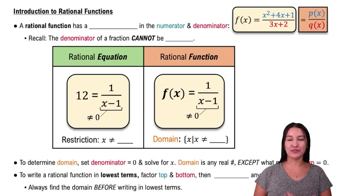Here are the essential concepts you must grasp in order to answer the question correctly.
Rational Functions
A rational function is a function that can be expressed as the ratio of two polynomials. The general form is f(x) = P(x)/Q(x), where P(x) and Q(x) are polynomials. Understanding rational functions is crucial for determining their properties, including their domain, which is influenced by the behavior of the denominator.
Recommended video:
Intro to Rational Functions
Domain of a Function
The domain of a function refers to the set of all possible input values (x-values) for which the function is defined. For rational functions, the domain is restricted by the values that make the denominator equal to zero, as division by zero is undefined. Identifying these restrictions is essential for accurately determining the domain.
Recommended video:
Domain Restrictions of Composed Functions
Finding Restrictions
To find the domain of a rational function, one must identify the values of x that cause the denominator to equal zero. This involves solving the equation Q(x) = 0. The solutions to this equation represent the x-values that must be excluded from the domain, allowing for a complete understanding of where the function is valid.
Recommended video:
Restrictions on Rational Equations
 Verified step by step guidance
Verified step by step guidance Verified Solution
Verified Solution



 6:4m
6:4m